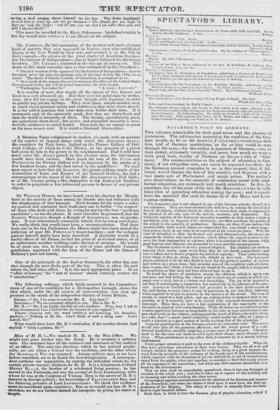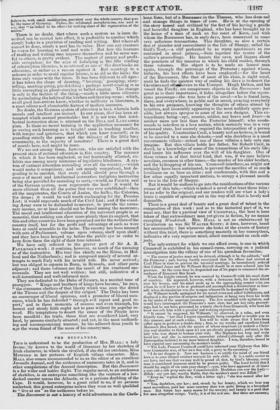FAULKNER'S VISIT TO GERMANY.
Two volumes remarkable for their good sense and the absence of' pretension. The information respecting the condition of the Ger- man people, as far as Sir ARTHUR FAULKNER'S wanderings took him, and of German institutions:as far as they could be seen through the eyes,—for the author is ignorant of German,—are, to their extent, extremely valuable, and prove how much we Want a truly good book, worthy of Madame DE STAR L's title of "Ger- many." His communications on the subject of education in Ger- many, if not altogether new, can never be repeated too, often : for the Germans present examples to us in this respect, that, if fol- lowed, would change the face of this country, and dispense with a vast many acts of Parliament and much police. The author's own observations on the necessity of combining moral with intel- lectual education, are extremely well worth attention. In this, he considers, lies all the error of the late Mr. BROUGHAM'S (as he calls him) plan of spreading education among the poor ; and it consti- tutes the mischief (for such he deems it) of the BELL and LAN- CASTER systems.
The Lancaster plan is not adopted in any of the German schools, though it is not unknown. They are deenied essentially defective, by risking the loss of that first of all objects, without which no object, or worse than none, is supposed to be attained at all—the care of the morals, manners, and disposition. The wholesale rapidity of the Lancaster operation resembles in their notion a kind of machinery, and, as happens with machinery, too often sacrifices the quality of
the article to the quantity of production. esides, say they, if you increase the mental ability while moral duties are unprovided for, you create a most dange- rous power, ready at any time to be converted to the worst purposes. With the view of attending to their intellectual and moral idiosyncrasies, the classes are respectively broken into small sections, which allows the superintendent to ob- serve the least impropriety at a glance, when it is checked on the instant, while good humour and diligence are promoted by every possible encouragement.
The Pestalozzi system is in very general adoption. The children are made to exercise their reason upon every thing they do not clearly comprehend; and care is taken not to force a progress beyond their capacity:. Thus understanding every thing.as they go along, they take delight in their task. The Lancaster plan is admitted to be the best fitted to turn out the greatest number of readers and writers in a given time; but, securing none of the weightier ends of educa- tion, it puts, they think, a lever into the hands of the people, which is dangerous in proportion as they have not been directed how to use it.
To avoid the abuses of emulation among the children, which is apt to run i
into envy and bad feeling, the school prize s made not to consist in selfish tri- umph over a rival, but in a victory over knowledge. The joy to be inspired is not that of outstripping a competitor, but exclusively in the pleasure of the pur- suit. Lessons so carefully learned and grounded at the Most docile season of life, and during so many years, it may be presumed, do not lose their influence when required to be put in practice in the business of the world. The tone of morals is raised to a high pitch, and any sinking below it rendered next to im- possible, or if it occurred, sure to be visited with universal discountenance or contempt. Here, then, we have a full explanation of the superiority of the Germans in point of civil subordination. While all classes are so well instructed, wanton oppression becomes as improbable in the ruler as tame submission or un- provoked revolt in the subject; making good the words of Plato, who laid it down as a rule, that "a sound moral institution would render the office of a judge as much a sinecure as a good system of bodily training that of the physician. Corporal punishments at the German schools are extremely rare. The aim is to call into play all the generous affections, and the whole power of a well- directed emulation, carefully inspiring a proper sense of self-respect. Chastise- ment is for the same end made to work upon their shame, never through their fears. When punishment in any other form is resorted to, it is merely solitary confinement.
Every proper attention is paid to the state of the children'shealth. When ill, they have gratuitous attendance at their own houses. They are all well and warmly clothed, the pecuniary means for so doing being in a great measure de- rived from the proceeds of the industry of the female part of the establishment, which, together with the donations of private individuals in aid of contributions raised from the public, when put together, accumulate a fund that nearly covers all the expenses of the institution; and when any debt remains unsatisfied, it is borne by the Government.
That no time shall be unprofitably squandered, there is but one fortnight of vacation in the whole year ; and this is taken up in repairs of the building and in cleansing and white-washing the class-rooms. Government appoints commissioners for the election of the director and masters of the Freischfile, and when the choice is fixed upon it must have the final ap- probation of his Majesty. The salary of a teacher is annually from two hun- dred to eight hundred dollars.
Such then, in brief, is here the German plan of popular education, which I
'believe is, -with modilicationi prevalent ever the whole: country.that,goes by the name of .-Germany. Fichte,. tha celebrated metaphysician, was used to say, that " lie.looked tc ita effects for •nothing-short of the regeneration, a. the nation." • There is no doubt, -that where -such. a system as is-here de- scribed can be carried into effect, it is preferable to another which simply 'looks to a provision of reading and writing. . But where all 'cannot be done, surely a part has its value. 'How can any creature be worse for learning to read and -write? But how the learners .of reading and writing. may improve themselves and be more use- ful to others, is pretty evident. The neglect of -proper and-profit- able occupations for the sake of indulging in the .idle reading of subscription libraries, is mentioned as one of the drawbacks on education, or rather as a reason against it. But resorting to a • scheme in order to avoid regular labour, is as old as the hills; the form only varies with the times. It has been different in all ages : it has taken the shape • of dancing, " lovering," gossiping, story- -telling, meeting-going, gin-drinking : perhaps novel-reading is as little corrupting as ghost-storying or ballad-singing. The change is only in the fashion of the thing,made a little more offensive by assimilating the habits of the kitchen and drawing-room ; ,which, as all good housewives know, whether in millinery or literature, is a most odious and abominable featute of modern manners.
No doubt, the German system of education is best, wherein both morals and intellect . are trained. In our plans, that has been at- -tempted which seemed practicable : but it is not true that intel- lectual instruction alone is attained on the BELL and LANCASTER plan. Is there no moral training in the application necessary for prucuring such learning as is taught? none in teaching another, -with temper and quietness, that which you know yourself; or in .guarding strictly the peace and the industry of the little busy -community, in the capacity of monitors? There is a great deal of morals here, and might be more. We are not among those, however, who are satisfied with the present state of national education in this country. The manner in which it has been neglected, or but fractionally effected, ex- .hibits one among many instances of legislative blindness. A sys- -tem of national education extending over all the con ntry,—which would make it compulsory, and not merely compulsory, but de- grading to be omitted, that every child should pass through a course of moral and intellectual instruction (religious instruction being also provided for according to sect),—would, as FICHTE said of the German system, soon regenerate the land : it would be more efficient than all the police that was ever established—than all the magistrates, the Courts of Assize, the hulks, the Colonies, the drops ; . it would be well worth exchanging for the Pension List; it would supersede much of the Civil List; and if the stand- ing Army, were to be disbanded to-morrow, to provide the neces- sary income, we at least should not he found among the mournere. The moral and intellectual education of the universal people is so essential, that nothing can show more plainly than its neglect, that this and other countries have been governed not for the welfare of the -country itself, but for the profit and advantage of such as were born or could scramble-to the helm. The country has been amused with acts of Parliament, volume upon volume, shelf upon shelf; and they have been heaped up before the public eye in order to keep from them the sight of their true interest. . We have only referred to the graver part of Sir A. B. FAULKNER'S work : it contains, however, as much of the amusing as of the instructive. His tour lies chiefly on the Rhine, in Hol- land and the Netherlands ; and is composed mainly of several at- tempts to reach Italy with his invalid wife. He never arrived ; but was obliged to sojourn in Bonn, in Brussels, and other parts adjacent; and these volumes are the result of his combined me- moranda. They are not well written; but still, indicative of a well-intentioned and well-informed man.
They are dedicated to the Duke of SUSSEX, in a merited tone of panegyric. "Kings and brothers of kings have become," he says, "the strenuous abettors of that liberty which was once the dread of the Throne and the despair of the subject." The Duke has been an encourager of liberal opinions, and a promoter of liberal mea- sures, which he has defended" through evil. report and good re- port;" and 'in these moments of -success and even triumph, his honest and steady faith ought not to pass without its popular re- ward. His temptations to desert the cause of the People have been manifold : his trials, those that are considered hard, very hard, by persons similarly situated; arid yet, in the most unflinch- ing and uncompromising manner, he has adhered from youth to age the warm friend of the mass of his countrymen.




























 Previous page
Previous page